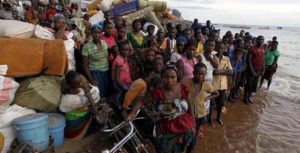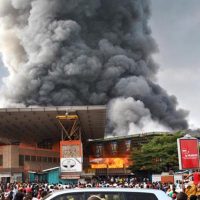UN Refugee Agency is concerned about the unstable situation in Burundi which continues to drive people to flee to neighboring countries for their safety.

UNHCR says Burundians continue to flee to neighboring countries
“Arriving refugees continue to cite human rights abuses, fear of persecution and Sexual and Gender-Based Violence (SGBV) as reasons for fleeing”, says Babar Baloch, UNHCR spokesperson, at the press briefing at the “Palais des Nations” in Geneva.
The UNCHR spokesperson says the total number of refugees is expected to grow to over half a million by the end of 2017 – making it potentially the third biggest refugee situation in Africa.
Baloch says UNHCR has updated its funding needs for the Burundi situation to US$250 million (from US$214). “Resources are badly needed to provide emergency assistance to the new arrivals and proper support to their hosts. UNHCR has so far received only two per cent of the required funds”, says the UNHCR spokesperson.
He says refugees’ living conditions in neighboring countries are extremely difficult. More arrivals are over-stretching the reception capacity in refugee camps, especially in Tanzania, Rwanda and the DRC. “Urgent funding is needed to upgrade and construct new settlements to decongest the current ones and provide basic services”, he says.
UNHCR renews its call to donors for continued support to countries hosting Burundian refugees.
We also appeal to the neighboring countries to allow continued access to those fleeing the situation in Burundi and not to return them against their will.
Térence Ntahiraja, Assistant to and Spokesperson for the Ministry of Home Affairs says about 156, 000 Burundians out of 260, 000 refugees, who have fled the country since April 2015, have returned home. “The UNHCR still keeps the database of all Burundians who have fled to those countries since a long time. Their figures are not updated”, he says.
The Assistant Minister says Burundian refugees who have the will to return home face some challenges. Ntahiraja says the UN refugee agencies do not allow them to leave their camps for different reasons including political ones. “The UN agents want to keep their jobs at the expense of the refugees”, says Ntahiraja.
The UNHCR reports that Tanzania is currently hosting the majority of Burundian refugees with some 249,000 already accommodated in three overcrowded camps. Rwanda hosts some 84,000 refugees with another 45,000 in Uganda and some 41,000 in the DRC .Since April 2015, some 410,000 refugees and asylum seekers have been forced to flee their homes.



















 IWACU Open Data
IWACU Open Data

